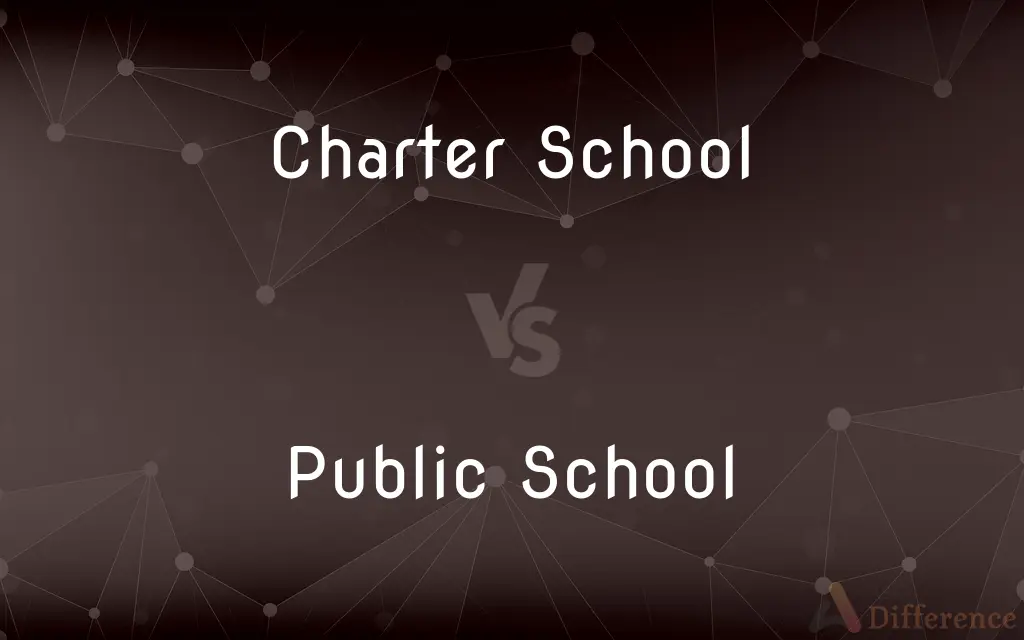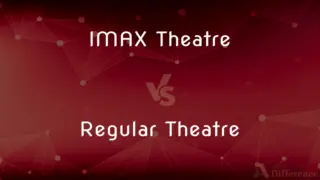Charter School vs. Public School — What's the Difference?
Edited by Tayyaba Rehman — By Fiza Rafique — Published on November 11, 2023
Charter Schools are publicly funded but operate independently under specific charters; Public Schools are government-run and follow state curriculums.

Difference Between Charter School and Public School
Table of Contents
ADVERTISEMENT
Key Differences
Charter Schools and Public Schools are both educational institutions that receive public funding. The primary distinction lies in their governance and operational flexibility. Charter Schools function under a charter, or a contract, granting them more autonomy in certain areas, including curriculum and hiring practices.
Public Schools, on the other hand, are managed by school districts and must adhere to the educational guidelines and curriculums set by the state. They are subject to regulations and oversight by the state's department of education and usually have less flexibility in instructional methods or curriculum choices.
Charter Schools can be established by teachers, parents, or community groups under a performance contract with the state or school district. This charter details the school's mission, program, goals, students served, and evaluation methods. If Charter Schools do not meet their performance criteria, they can be shut down.
While Public Schools must serve all students in their jurisdiction, Charter Schools often have the capacity to limit their enrollment, leading to lottery systems or waitlists. This can sometimes make Charter Schools appear selective, though they cannot discriminate during admissions.
Both Charter and Public Schools aim to provide quality education. The choice between them often boils down to parents' preference regarding curriculum, school culture, and the specific needs of the student.
ADVERTISEMENT
Comparison Chart
Governance
Operate under specific charters.
Governed by school districts.
Flexibility
More autonomy in operations.
Must adhere to state curriculums.
Funding
Publicly funded, can sometimes receive private donations.
Solely publicly funded.
Admissions
May have limited enrollment.
Must accept all students in jurisdiction
Oversight
Charter authorizer, usually less regulated.
Heavily regulated by state and district.
Compare with Definitions
Charter School
A publicly funded institution with autonomy in decision-making.
The Charter School's teaching approach is unique in the district.
Public School
A government-operated institution funded by taxpayer money.
The local Public School has a diverse student population.
Charter School
An independently-run public school operating under a performance contract.
The local Charter School emphasizes project-based learning.
Public School
A school that follows the educational curriculum set by the state.
The Public School ensures standardized education for all its students.
Charter School
An educational entity operating under a charter or contract.
The Charter School was established by a group of passionate educators.
Public School
An institution overseen by the school district and state department.
Public Schools provide free education to residents in their jurisdiction.
Charter School
A school funded by public resources but with greater flexibility in its operations.
Parents chose the Charter School for its innovative curriculum.
Public School
A universally accessible school, supported by public funds.
The Public School has a long-standing history in the community.
Charter School
A school that receives public funding but functions with more independence.
Enrollment in the Charter School is through a lottery system.
Public School
A school that serves the general public and adheres to state regulations.
The neighborhood Public School hosts annual community events.
Public School
Attributive form of public school
Public-school student
Public School
Alternative form of public school
Common Curiosities
Are Public School teachers required to be certified?
Typically, yes. Public School teachers usually must meet state certification requirements.
Are Charter Schools publicly funded?
Yes, Charter Schools are primarily funded with public money, though they may also receive private donations.
Can Charter Schools be selective in admissions?
Charter Schools must have an open admissions policy but can limit enrollment due to capacity.
Can Charter Schools design their own curriculum?
Yes, Charter Schools often have the flexibility to design or choose their own curriculums.
Do Public Schools cater to specific educational philosophies?
While some may have specialty programs, Public Schools generally follow a standard curriculum set by the state.
How do Charter Schools differ in accountability?
Charter Schools are accountable to their charter authorizer and must meet the performance criteria in their charter.
Who can start a Charter School?
Teachers, parents, community groups, or organizations can initiate the establishment of a Charter School.
Can Public Schools refuse student admissions?
No, Public Schools must serve all students in their designated jurisdiction.
Do Public Schools charge tuition?
No, Public Schools are funded by taxpayers and do not charge tuition.
Are Charter Schools a part of the school district?
While they may be authorized by the district, Charter Schools operate independently.
How are Public Schools funded?
Public Schools are funded through local, state, and federal taxpayer money.
Are all Public Schools the same in quality?
No, the quality of Public Schools can vary based on resources, leadership, and other factors.
How are Public Schools held accountable?
Public Schools are held accountable through standardized testing, state regulations, and school district oversight.
Can Charter Schools be for-profit entities?
Most Charter Schools are non-profit, but some states allow for-profit entities to manage them.
How do Charter and Public Schools handle special education?
Both are required to provide special education services, though the approach and resources might differ.
Share Your Discovery

Previous Comparison
IMAX Theatre vs. Regular Theatre
Next Comparison
Cherry Wood vs. MahoganyAuthor Spotlight
Written by
Fiza RafiqueFiza Rafique is a skilled content writer at AskDifference.com, where she meticulously refines and enhances written pieces. Drawing from her vast editorial expertise, Fiza ensures clarity, accuracy, and precision in every article. Passionate about language, she continually seeks to elevate the quality of content for readers worldwide.
Edited by
Tayyaba RehmanTayyaba Rehman is a distinguished writer, currently serving as a primary contributor to askdifference.com. As a researcher in semantics and etymology, Tayyaba's passion for the complexity of languages and their distinctions has found a perfect home on the platform. Tayyaba delves into the intricacies of language, distinguishing between commonly confused words and phrases, thereby providing clarity for readers worldwide.












































